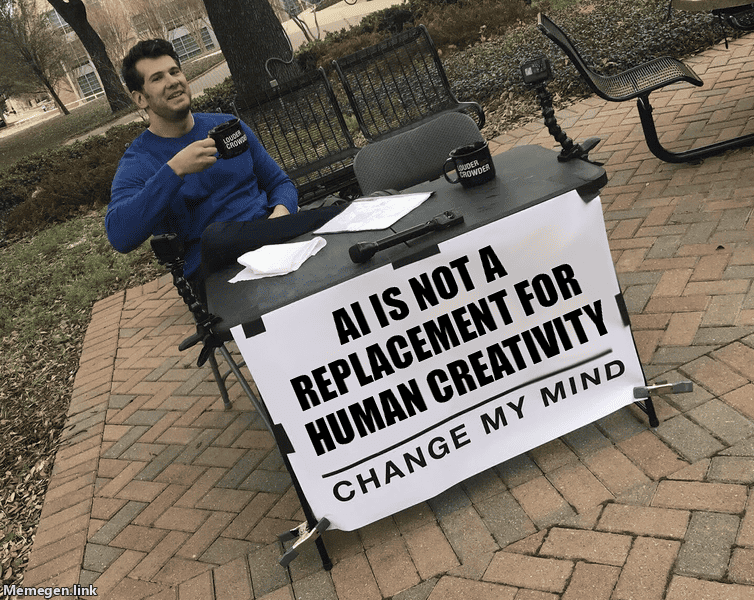Artificial intelligence (AI) has significantly impacted the landscape of digital marketing. This innovative technology has infiltrated numerous sectors, including marketing.
But what does this mean for content marketing? And why is it important for marketers to pay attention? AI focuses on developing machines with human-like thinking and learning abilities. It aims to automate tasks, improve efficiency, and unlock new opportunities.
When it comes to content marketing AI can be a game changer. It enables marketers to produce superior content, target the right audience effectively, and ultimately increase conversion rates.
Understanding AI in Content Marketing
AI has gained considerable attention in the field of marketing but how exactly does it affect content marketing?
At its core definition, AI involves machines mimicking human intelligence like learning from experiences adapting to new information as well as successfully carrying out tasks requiring human intellectuality. AI is not just limited to being some hypothetical idea when it comes to dealing with creating better and more engaging online material. As marketers progressively discover its power, predictive analytics alongside efficient automation are among its features. This advanced machinery helps identify important information about the target audience such as tastes, preferences & behavioral patterns.
Nonetheless, it’s crucial to understand that AI isn’t a magic solution to all problems. It’s a tool that can support content marketing efforts if effectively implemented. Keeping in mind its capacities and limitations will ensure successful achievement of goals. This article will now provide different yet detailed instances of AI applications within content marketing using real-life situations.

AI Use Case 1: Content Creation
One of the most revolutionary applications of AI in content marketing is content creation. While it may seem like something out of a science fiction novel. AI is already being utilized to generate content. But how exactly does this work?
AI-powered tools, especially those that use natural language generation (NLG) technology have the ability to transform raw data into captivating narrative content. For example, you can input data about the latest features of your product and the AI tool can create a persuasive product description or even a blog post. This goes beyond simply saving time or reducing workload; its’ about harnessing technology to produce top-quality content that resonates with your audience.
One such tool is Jasper, an AI writing assistant that aids in creating blog posts, ads, emails, website content, and more. Jasper utilizes advanced machine learning algorithms to comprehend the context and generate content that aligns with your requirements. It has the ability to write in various tones, styles, and formats making it an adaptable tool for content marketers.
But Jasper is more than just a writing tool – its a partner that helps you brainstorm ideas create engaging narratives and refine your content until its perfect. With Jasper by your side. You can go from staring at a blank page to producing polished content in record time. For a comprehensive list of AI content creation tools, be sure to check out our article on AI Content Creation Software.
However, it’s important to keep in mind that while AI can assist with content creation it cannot replace the need for human creativity and strategy. Yes AI can generate text; however, it lacks an understanding of your brand voice nuances and the specific demands of your audience compared to a human writer. Therefore the best utilization of AI is as an enhancer of human creativity rather than a substitute.
In fact, the most effective implementation of AI in content creation occurs when it plays a supportive role by handling mundane tasks allowing human writers to dedicate their time to the creative aspects of content creation. This collaboration between AI and human creativity is where the true potential of AI in content marketing lies.
AI Use Case 2: Personalized Content
In today’s digital era personalization emerges as an indispensable component. Remaining content with generic material no longer suffices; individuals yearn earnestly for tailor made encounters that cater flawlessly to their distinct requirements and preferences. It is at this juncture that the significance of AI becomes evident.
AI can analyze vast amounts of data about your audience, including their browsing behavior, purchase history, and social media activity. It can then use this data to create personalized content for each user. This could be as simple as addressing the user by their name in an email, or as complex as recommending products based on their past purchases and browsing behavior.
One company that’s leveraging AI for personalization is Netflix. Netflix uses AI to analyze user behavior and provide personalized movie and TV show recommendations. This not only enhances the user experience but also increases engagement and retention rates.
AI Use Case 3: Predictive Analytics
One area where AI greatly enhances content marketing is through the application of predictive analytics. By utilizing data analysis techniques such as statistical algorithms and machine learning methods predictive analytics allows for accurate predictions about future outcomes based on historical data. Specifically within the context of content marketing.
Predictive analytics provides valuable insights into what type of content will yield the highest performance results, which subjects are most captivating to your audience members. And how they are likely to engage with your material. Armed with this information-driven intelligence allows you to shape a well-informed strategy for creating compelling material.
An excellent illustration is BuzzSumo; it effectively utilizes predictive analytics tools for marketers who seek to identify emerging trends monitor brand mentions and track how different types of content fare against competitors or under specific topics.
It is essential leveraging this knowledge effectively that gives your competitive edge when developing an influential and purposeful overall digital strategy for yourself or any entity in question
AI Use Case 4: Customer Engagement
Engaging customers is a crucial element of content marketing and AI can play a significant role in improving this engagement. AI has the ability to help you gain a deeper understanding of your customers provide them with personalized experiences and interact with them instantly.
One way AI is being utilized to enhance customer engagement is through chatbots. Chatbots are software powered by AI that is designed to engage in conversations with humans using their natural language. These chatbots have the capability to address customer inquiries offer product suggestions and even assist with purchases all in real time.
Let’s consider the example of Sephora, a leading beauty retailer.
Sephora employs a chatbot on its website that provides tailored skincare recommendations. The chatbot asks users questions about their skin type and preferences and puts together recommendations based on this information. Not only does this greatly enhance the overall customer experience, but it also drives sales.
AI Use Case 5: SEO Optimization
Content marketing relies heavily on Search Engine Optimization (SEO) for its success. The purpose of SEO is straightforward: optimize the content in order to achieve higher rankings in search engine results pages (SERPs). Ultimately enhancing visibility and attracting greater organic traffic to your website.
An area where vast improvements have been made is through the use of Artificial Intelligence (AI) which significantly amplifies your SEO endeavors. With AIs’ capability to analyze copious amounts of SEO data. It reveals insights that would be an insurmountable task for humans to uncover manually. AI shines in its knack for recognizing patterns and trends within the data while effectively suggesting appropriate keywords or prognosticating highly effective SEO techniques. Moreover automation also finds a place in AIs’ toolkit when it comes to certain components of SEO implementation.
For instance, BrightEdge stands as an exemplary AI driven SEO platform empowering marketers with invaluable insights aimed at creating exceptional content experiences. Employing their AI advancements enables deep analysis encompassing critical factors like keywords selection and optimization strategies alongside backlink data assessment or monitoring social signals – all leading towards actionable recommendations that boost performance within the digital realm.
AI Use Case 6: Content Distribution
The distribution of content is just as important as its creation. It doesn’t matter how engaging or high quality your content is if it doesn’t reach the right audience. This is where AI comes in changing the game when it comes to content distribution. With AI powered tools you can analyze a large amount of data about user behavior, preferences, and engagement patterns. By using this information you can determine the most effective channels, times, and methods for distributing your content to each segment of your audience. This ensures that your content not only gets seen but is also seen by the people who are most likely to find it relevant and engaging.
An example of AI in action is Buffer, a social media management tool that uses AI to optimize content scheduling and distribution. Through analyzing past post performance and audience engagement patterns. Buffers’ AI determines the best times to post content on each social media platform. By doing so your content gets posted when your audience is most active and engaged increasing its visibility and impact.
This ensures that each user receives content that speaks directly to their interests and increases their engagement with it.
Overall. Incorporating AI in the distribution process allows you to target specific audiences with precision and increase both visibility and engagement rates for your valuable content.
AI Use Case 7: Email Marketing
Email marketing continues to be a highly effective method for connecting and captivating audiences. However, creating customized and compelling emails that resonate with each individual can seem overwhelming. This is where AI steps in.
Revolutionizing email marketing by enhancing personalization, efficiency, and effectiveness. By analyzing abundant data on user behavior, preferences, and engagement patterns AI enables the creation of personalized email content that truly connects with recipients. As a result open rates. Click through rates and conversions are all increased.
For example. AI can personalize email subject lines to captivate recipients and motivate them to open the email. Leveraging past email performance and user behavior data enables AI to determine which subject lines will be most responsive for each recipient.
Virgin Holidays is one company that has successfully embraced AI in their email marketing approach; by employing an AI tool to generate subject lines. They experienced a notable surge in email open rates and generated millions in additional revenue. Furthermore. AI can assess the ideal time for sending emails based on recipient responsiveness trends ensuring your messages arrive right when they are most likely to be opened and engaged with. Additionally. When it comes to segmenting your email list more effectively. AI excels at analyzing user behavior and engagement patterns to group together similar users allowing for tailored content that caters to each segments specific interests and needs.
Conclusion
In the realm of marketing, Artificial Intelligence holds far more significance than merely being an overused term; it stands as a formidable tool that reshapes our approach towards content marketing.
By leveraging AI’s capabilities encompassing content creation and personalization alongside predictive analytics and customer engagement techniques, marketers now possess the means to deliver sharper targeting with highly effective and creative content marketing campaigns.
However, it’s important to remember that AI is not a magic bullet. It’s a tool that, when used correctly, can enhance your content marketing efforts. But it doesn’t replace the need for a solid content strategy, a deep understanding of your audience, and, most importantly, valuable, high-quality content.
As we’ve seen through various real-world examples, AI is already making a significant impact in content marketing. And this is just the beginning. As AI technology continues to evolve, we can expect to see even more innovative applications in the field of content marketing.
So, whether you’re a seasoned content marketer or just getting started, it’s worth exploring what AI can do for you. Embrace the possibilities, experiment with different tools and techniques, and see how AI can take your content marketing to the next level.
Frequently Asked Questions
What are some AI use cases in content marketing?
AI is used in various aspects of content marketing, including content creation, content distribution, email marketing, content personalization, and content analysis. AI tools can generate content, optimize content for SEO, personalize content for individual users, determine the best times and channels for content distribution, and analyze content performance.
Can AI replace human content creators?
While AI can assist in content creation by generating text and optimizing content, it doesn’t replace the need for human creativity and strategy. AI doesn’t understand the nuances of your brand voice or the specific needs of your audience the way a human writer does. Therefore, AI is best used as a tool to augment human creativity, not replace it.
How does AI personalize content?
AI personalizes content by analyzing user behavior and preferences. This data is used to deliver personalized content recommendations, ensuring that each user receives content that is most relevant and interesting to them. This increases engagement and conversion rates.
How can AI improve email marketing?
AI can personalize email subject lines, determine the best time to send emails to each recipient, and segment your email list more effectively. This ensures that your emails are personalized, arrive in the recipient’s inbox at the most opportune time, and are tailored to each segment’s specific interests and needs.
What is the future of AI in content marketing?
The future of AI in content marketing looks promising. As AI technology continues to evolve, we can expect to see even more innovative applications of AI in content marketing. However, it’s important to remember that AI is a tool to assist with content marketing, not a replacement for a well-thought-out content marketing strategy.



